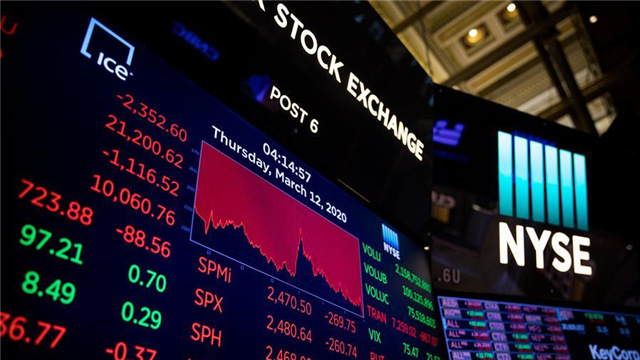US stock market sizzled in August


The S&P 500 this year notched its best August since 1986, and the Nasdaq Composite didn't fare too badly either as tech stocks have fueled the late-summer rally in the US.
The Nasdaq kept the bull running on Monday, although the S&P and the Dow Jones Industrial Average finished lower.
The Federal Reserve's willingness to not fret inflation and to keep interest rates low, along with positive developments in vaccines and treatments for COVID-19 also have helped buttress the market.
Jim Collins, founding partner, Portfolio Guru LLC and CEO of Excelsior Capital Partners in New York, is skeptical of the long rally.
"August will go down as the month in which the market capitulated to the torrent of free money from the Fed and stopped analyzing stocks," Collins told China Daily. "That doesn't bode well for the fall."
The Nasdaq finished the day almost 20 percent above its pre-coronavirus record close. Its top two catalysts on Monday were Apple Inc and Tesla Inc, after the two companies announced stock splits.
On Monday, the Nasdaq rose 79.82 points to 11,775, while the Dow fell 223.82 points to close at 28,430; the S&P 500 lost 7.7 points to 3,500.
Technology, healthcare and utilities stocks were the top percentage-gainers Monday among the 11 major S&P sectors, while energy was the leading laggard.
"It's a momentum trade. People are flooding to the technology companies they think will do well regardless of the pandemic," said Chris Zaccarelli, chief investment officer at Independent Advisor Alliance.
"After such a strong summer run, we're reverting back to the old pandemic playbook, so we see tech outperforming," said Mona Mahajan, senior US investment strategist at Allianz Global Investors in New York. "Really that's a defensive move as people think about stay-at-home more as we're heading toward that fall season."
For the month, the S&P gained 7.01 percent, its biggest advance in August since 1986.
The three main indices also recorded their fifth straight monthly increases following March lows.
The S&P's 35.6 percent gain since April marked the strongest five-month run for the bellwether index since 1938, according to data from Bespoke Investment Group.
"They've confirmed lower-for-longer rates as far as the eye can see," Richard Dunbar, head of multiasset research at Aberdeen Standard Investments, told The Wall Street Journal. "Alongside that confirmation of cheap money and cheap discount rates, we've just come through a US earnings season that's been a lot better than feared."
There still is market risk over whether Congress will agree on more coronavirus relief aid.
"There's uncertainty about future support," Dunbar said. "Investors are nervous generally, and keen to see support continue through low interest rates and fiscal policy. Any discussion of that being disrupted can make investors nervous."
The campaign for the White House also is a factor.
"We have a pretty big disparity between the two candidates and the two potential administrations," Jason Pride, chief investment officer of private wealth at Glenmede told the Journal. "The market is basically saying that this is a big election."
Shares of Microsoft Corp, Walmart Inc and Oracle Corp — all contenders for TikTok's US assets — fell Monday as China's new rules around tech exports mean a deal with TikTok owner ByteDance could require Beijing's approval.
China on Friday introduced export restrictions on artificial intelligence technology, seemingly including the type that TikTok uses to choose which videos to queue up to its users. That means ByteDance would have to obtain a license to export any restricted technologies to a foreign company.
"As with any cross-border transaction, we will follow the applicable laws, which in this case include those of the US and China," said ByteDance General Counsel Erich Andersen.
"TikTok is an incredibly valuable property, and it's no surprise that so many rumored bidders are interested. I even use it myself," Collins said. "Best fit is with Microsoft, but acquired properties there (LinkedIn, Skype, etc.) tend to fade into the background, so I would rather see TikTok (ByteDance) stay independent."
The Trump administration has threatened to ban TikTok by mid-September and has ordered ByteDance to sell its US business, claiming national security risks.
TikTok has maintained that all its user data is stored in the US and is not shared with anyone. It also is suing the administration over the threatened ban.
Reuters and The Associated Press contributed to this story.
































